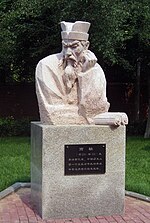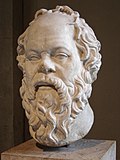hostile to the philosophy of ancient China, the influences of past are still deeply ingrained in the Chinese culture. In the post-Chinese economic reform...
41 KB (4,902 words) - 06:44, 7 August 2024
Wuxing (Chinese: 五行; pinyin: wǔxíng), usually translated as Five Phases or Five Agents, is a fivefold conceptual scheme used in many traditional Chinese fields...
32 KB (2,337 words) - 01:26, 31 July 2024
Warring States period classical Chinese philosophy, whose ideas contributed greatly to the formation of the bureaucratic Chinese empire, and Daoism as prominent...
78 KB (11,176 words) - 21:54, 11 August 2024
thought. Central topics in Chinese philosophy were right social conduct, government, and self-cultivation. In early Chinese philosophy, Confucianism explored...
209 KB (21,455 words) - 07:14, 29 July 2024
traditions in the history of philosophy include Western, Arabic–Persian, Indian, and Chinese philosophy. Western philosophy originated in Ancient Greece...
214 KB (18,381 words) - 13:07, 31 July 2024
Chinese Marxist philosophy is the philosophy of dialectical materialism that was introduced into China in the early 1900s and continues in Chinese academia...
13 KB (1,655 words) - 04:08, 13 April 2024
including Chinese philosophy, Japanese philosophy, Korean philosophy, and Vietnamese philosophy; which are dominant in East Asia, and Indian philosophy (including...
84 KB (9,524 words) - 14:27, 2 August 2024
Akan philosophy Ethiopian philosophy Ubuntu philosophy Chinese philosophy Indian philosophy Indonesian philosophy Japanese philosophy Korean philosophy Vietnamese...
33 KB (3,075 words) - 20:28, 17 July 2024
exponent of the Advaita Vedanta school of philosophy Chinese philosophy is the dominant philosophical thought in China and other countries within the East Asian...
28 KB (3,239 words) - 21:48, 6 July 2024
Syncretism or the Mixed School (Chinese: 雜家; pinyin: zájiā) in Chinese philosophy is an eclectic school of thought that combined elements of Confucianism...
1 KB (75 words) - 21:20, 11 April 2024
philosophical studies of China) and 中国土上的本土哲学 (indigenous philosophy from Chinese soil). The debates over the legitimacy of Chinese philosophy primarily concern...
29 KB (4,089 words) - 14:42, 28 March 2024
In Chinese philosophy, taiji (Chinese: 太極; pinyin: tàijí; Wade–Giles: tʻai chi; trans. "supreme ultimate") is a cosmological state of the universe and...
18 KB (2,114 words) - 14:46, 17 July 2024
Metaphysics (redirect from Metaphysics in Chinese philosophy)
Metaphysics is the branch of philosophy that examines the basic structure of reality. It is often characterized as first philosophy, implying that it is more...
168 KB (16,045 words) - 17:08, 11 August 2024
traditional Chinese culture, the Chinese zodiac is very important and exists as a reflection of Chinese philosophy and culture. Chinese folkways held...
61 KB (4,477 words) - 21:58, 8 August 2024
dynasty (2nd century BC to 2nd century AD). Chinese astrology has a close relation with Chinese philosophy (theory of the three harmonies: heaven, earth...
21 KB (1,227 words) - 01:27, 7 April 2024
Taoist philosophy (Chinese: 道家; pinyin: Dàojiā; lit. 'Tao school') also known as Taology refers to the various philosophical currents of Taoism, a tradition...
35 KB (4,252 words) - 05:43, 7 June 2024
In Chinese philosophy, wuji (simplified Chinese: 无极; traditional Chinese: 無極; lit. 'without roof/ridgepole', meaning 'without limit') originally referred...
17 KB (2,138 words) - 13:24, 11 August 2024
Confucianism (redirect from Confucian philosophy)
thought and behavior originating in ancient China, and is variously described as a tradition, philosophy (humanistic or rationalistic), religion, theory...
128 KB (15,164 words) - 18:00, 11 August 2024
Chinese culture (simplified Chinese: 中华文化; traditional Chinese: 中華文化; pinyin: Zhōnghuá wénhuà) is one of the world's oldest cultures, originating thousands...
116 KB (13,384 words) - 02:08, 9 July 2024
Idealism (redirect from Idealism (philosophy))
Idealism in philosophy, also known as philosophical idealism or metaphysical idealism, is the set of metaphysical perspectives asserting that, most fundamentally...
112 KB (14,491 words) - 11:47, 30 June 2024
Tao (redirect from Do (philosophy))
Purchas (1625). Asha Brahman Absolute (philosophy) Nu (mythology) Wuji (philosophy) Chinese: 道; pinyin: dào(Chinese) Tao Te Ching, Chapter 1. "It is from...
49 KB (6,214 words) - 02:35, 2 August 2024
Yin and yang (redirect from Yang (philosophy))
/jæŋ/), also yinyang or yin-yang, is a concept that originated in Chinese philosophy, describing an opposite but interconnected, self-perpetuating cycle...
35 KB (4,142 words) - 09:03, 2 August 2024
Chance, Philosophy of - Chinese philosophy - Christian existentialism - Christian humanism - Christian philosophy - Cognitivism - Color, philosophy of -...
12 KB (769 words) - 21:22, 5 August 2024
Laozi (category Articles containing Chinese-language text)
Laozi (/ˈlaʊdzə/, Chinese: 老子), also romanized as Lao Tzu and various other ways, was a semi-legendary ancient Chinese philosopher, author of the Tao Te...
40 KB (4,465 words) - 12:34, 1 August 2024
In Chinese philosophy, yi (simplified Chinese: 义; traditional Chinese: 義; pinyin: yì) refers to righteousness, justice, morality, and meaning. In Confucianism...
3 KB (236 words) - 09:47, 3 April 2024
Tantric practices. The philosophy of Chinese Chan Buddhism and Japanese Zen is based on various sources; these include Chinese Madhyamaka (Sānlùn), Yogacara...
145 KB (18,616 words) - 15:51, 6 August 2024
Mohism (redirect from Mohist philosophy)
Mohism or Moism (/ˈmoʊɪzəm/, Chinese: 墨家; pinyin: Mòjiā; lit. 'School of Mo') was an ancient Chinese philosophy of ethics and logic, rational thought,...
31 KB (4,138 words) - 01:18, 1 August 2024
A Short History of Chinese Philosophy (simplified Chinese: 中国哲学简史; traditional Chinese: 中國哲學簡史; pinyin: Zhōngguó zhéxué jiǎnshǐ) is a book by Feng Youlan...
2 KB (55 words) - 23:23, 6 July 2023
Chinese cuisine comprises cuisines originating from China, as well as from Chinese people from other parts of the world. Because of the Chinese diaspora...
62 KB (6,892 words) - 18:21, 10 August 2024
both Chinese philosophy and Indian philosophy, as with Mitogaku and Zen, much modern Japanese philosophy is now also influenced by Western philosophy. Before...
27 KB (3,526 words) - 06:04, 23 July 2024

















